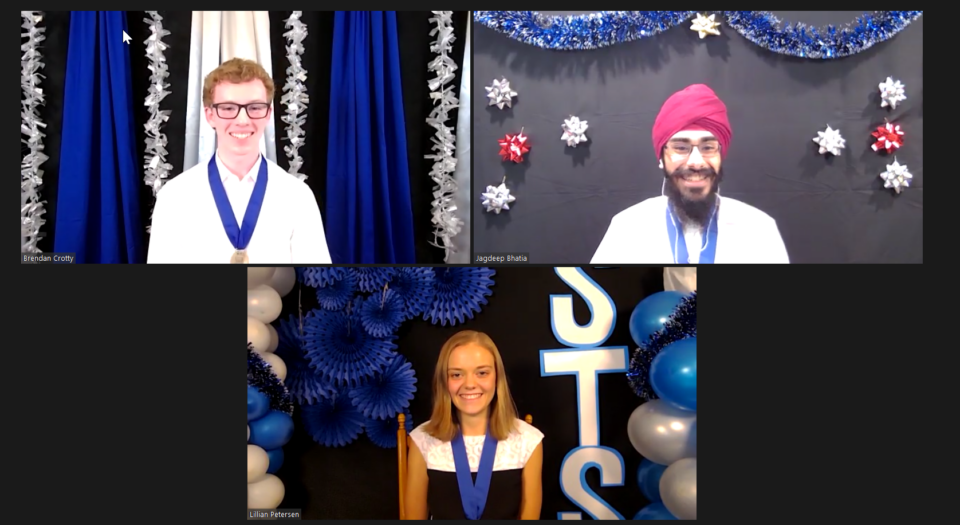Congratulations to the 2020 Regeneron Science Talent Search Finalists!
For the first time in its history, the Regeneron Science Talent Search took place virtually in order to keep finalists and their families safe during the ongoing coronavirus pandemic. More than $1.8 million was awarded to the finalists, who were evaluated based on the scientific rigor of their projects, their exceptional problem-solving abilities and their potential to become scientific leaders. Read about the top ten winners below.

The Top Ten 2020 Regeneron STS Winners
First Place: Lillian Petersen
Award Value: $250,000
City, State: Los Alamos, NM
Lillian Kay Petersen, 17, of Los Alamos, N.M., devised a simple tool for predicting harvests early in the growing season that could improve food distribution planning. She first validated her tool, which analyzes daily satellite imagery using accepted measures of vegetation health,on known domestic crop data.She then tested it for countries in Africa and successfully predicted harvests with high accuracy against reported yields.
Second Place: Jagdeep Bhatia
Award Value: $175,000
City, State: Green Brook, NJ
Jagdeep Bhatia, 17, of Green Brook, N.J., developed two fast and simple machine learning algorithms for computer programs that are attempting to learn new concepts under the tutelage of an instructor, either a computer or human. His algorithms do not only ask random questions but, like a savvy detective, ask just the right ones. His AI algorithms could help train robots and other automated devices faster and easier.
Third Place: Brendan Crotty
Award Value: $150,000
City, State: Muskogee, OK
Brendan Joseph Crotty, 17, of Muskogee, Okla., designed and built an efficient hybrid gas burner that could help reduce the ecological impact of industries like power generation and materials manufacturing. His specialized burner system operates at higher temperatures than current industrial burners yet emits 19 percent less polluting nitrogen dioxide gas. To build his model, Brendan had to become proficient in computer design software, metal casting and machining.
Fourth Place: Rupert Li
Award Value: $100,000
City, State: Portland, OR
Rupert Michael Li, 17, of Portland, Ore., submitted a math theory project that resolved an abstract algebra question concerning the “abelian sandpile model” to explore the underlying algebraic structure of a group. His creative approach to a specific type of mathematical model defined on graphs suggests a new approach that other mathematicians studying similar problems may find useful.
Fifth Place: Anaiah Thomas
Award Value: $90,000
City, State: Teaneck, NJ
Anaiah Bre Thomas, 18, of Teaneck, N.J., investigated how the natural killer (NK) immune cells, CD56bright and CD56dim, are influenced by cancer cells, research that could one day lead to new cancer therapies. CD56bright NK cells stop CD56dim NK cells from attacking healthy tissue. When Anaiah cultured these NK cells together with cancer-derived fibroblast cells that can stimulate changes in their function, she found that NK cells can switch type based on their microenvironment.
Sixth Place: Katherine St George
Award Value: $80,000
City, State: Merrick, NY
Katherine June St George, 17, of Merrick, N.Y., studied the impact of diet and caffeine on seizures using fruit flies. A high-fat, low-carbohydrate ketogenic diet can lessen seizures caused by imbalances in certain neurotransmitters, while caffeine can increase them. Katherine fed her fruit flies different diets and exposed them to caffeine. She observed that flies fed a ketogenic diet were not as susceptible to caffeine-induced seizures, which may inform diet counseling for human seizure patients.
Seventh Place: Alek Westover
Award Value: $70,000
City, State: Belmont, MA
Alek Michael Westover, 17, of Belmont, Mass., created a new parallel partition algorithm that he demonstrated can improve the speed of certain computations. He compared the performance of his algorithm to four others previously developed, and his algorithm performed better than each of them in at least one respect. Theoretical work such as this can be used to improve many computer applications, such as those that facilitate database queries, by simultaneously providing speed and robustness.
Eighth Place: Adriane Thompson
Award Value: $60,000
City, State: Westerville, OH
Adriane Elizabeth Thompson, 17, of Westerville, Ohio, identified new regulatory pathways in corn plants that may help to determine growth factors and predict yields for this vital crop. By noting where levels of gene expression changed in the main pathway that uses enzymes to turn off certain genes, she deduced which genes do not need the enzyme to maintain repression, thus indicating that they use novel pathways to regulate gene expression.
Ninth Place: Rohan Wagh
Award Value: $50,000
City, State: Portland, OR
Rohan Mahesh Wagh, 17, of Portland, Ore., developed a bacteria-powered sensor system that can wirelessly send farmers up-to-date measurements of soil moisture and nutrient conditions, which could reduce the amount of irrigation water wasted. His design includes microbial fuel cell modules as sensors and an algorithm he wrote to interpret the data and generate a map of soil conditions. He believes his system could improve water use and increase crop yields for around $100 per acre.
Tenth Place: Arjun Neervannan
Award Value: $40,000
City, State: Irvine, CA
Arjun R Neervannan, 17, of Irvine, Calif., created AI software designed to identify hateful or toxic content, often a form of cyberbullying, with less bias than current programs. Algorithms with built-in biases that associate toxicity with racial, gender and other such identity terms can result in inappropriate censoring of productive discussions. Arjun believes his scalable, automated debiasing process produces a more accurate and fair AI model.